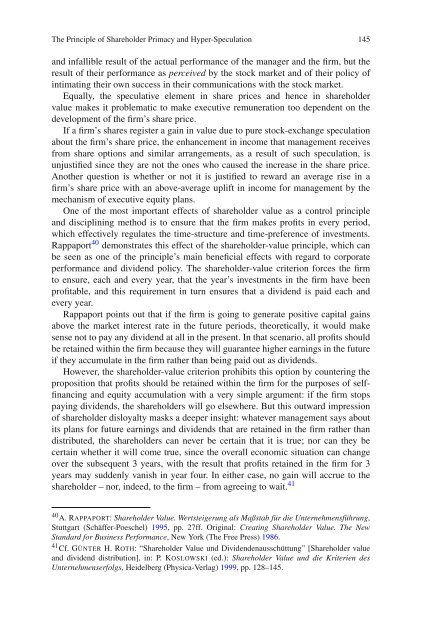The Ethics of Banking: Conclusions from the Financial Crisis (Issues ...
The Ethics of Banking: Conclusions from the Financial Crisis (Issues ...
The Ethics of Banking: Conclusions from the Financial Crisis (Issues ...
You also want an ePaper? Increase the reach of your titles
YUMPU automatically turns print PDFs into web optimized ePapers that Google loves.
<strong>The</strong> Principle <strong>of</strong> Shareholder Primacy and Hyper-Speculation 145<br />
and infallible result <strong>of</strong> <strong>the</strong> actual performance <strong>of</strong> <strong>the</strong> manager and <strong>the</strong> firm, but <strong>the</strong><br />
result <strong>of</strong> <strong>the</strong>ir performance as perceived by <strong>the</strong> stock market and <strong>of</strong> <strong>the</strong>ir policy <strong>of</strong><br />
intimating <strong>the</strong>ir own success in <strong>the</strong>ir communications with <strong>the</strong> stock market.<br />
Equally, <strong>the</strong> speculative element in share prices and hence in shareholder<br />
value makes it problematic to make executive remuneration too dependent on <strong>the</strong><br />
development <strong>of</strong> <strong>the</strong> firm’s share price.<br />
If a firm’s shares register a gain in value due to pure stock-exchange speculation<br />
about <strong>the</strong> firm’s share price, <strong>the</strong> enhancement in income that management receives<br />
<strong>from</strong> share options and similar arrangements, as a result <strong>of</strong> such speculation, is<br />
unjustified since <strong>the</strong>y are not <strong>the</strong> ones who caused <strong>the</strong> increase in <strong>the</strong> share price.<br />
Ano<strong>the</strong>r question is whe<strong>the</strong>r or not it is justified to reward an average rise in a<br />
firm’s share price with an above-average uplift in income for management by <strong>the</strong><br />
mechanism <strong>of</strong> executive equity plans.<br />
One <strong>of</strong> <strong>the</strong> most important effects <strong>of</strong> shareholder value as a control principle<br />
and disciplining method is to ensure that <strong>the</strong> firm makes pr<strong>of</strong>its in every period,<br />
which effectively regulates <strong>the</strong> time-structure and time-preference <strong>of</strong> investments.<br />
Rappaport 40 demonstrates this effect <strong>of</strong> <strong>the</strong> shareholder-value principle, which can<br />
be seen as one <strong>of</strong> <strong>the</strong> principle’s main beneficial effects with regard to corporate<br />
performance and dividend policy. <strong>The</strong> shareholder-value criterion forces <strong>the</strong> firm<br />
to ensure, each and every year, that <strong>the</strong> year’s investments in <strong>the</strong> firm have been<br />
pr<strong>of</strong>itable, and this requirement in turn ensures that a dividend is paid each and<br />
every year.<br />
Rappaport points out that if <strong>the</strong> firm is going to generate positive capital gains<br />
above <strong>the</strong> market interest rate in <strong>the</strong> future periods, <strong>the</strong>oretically, it would make<br />
sense not to pay any dividend at all in <strong>the</strong> present. In that scenario, all pr<strong>of</strong>its should<br />
be retained within <strong>the</strong> firm because <strong>the</strong>y will guarantee higher earnings in <strong>the</strong> future<br />
if <strong>the</strong>y accumulate in <strong>the</strong> firm ra<strong>the</strong>r than being paid out as dividends.<br />
However, <strong>the</strong> shareholder-value criterion prohibits this option by countering <strong>the</strong><br />
proposition that pr<strong>of</strong>its should be retained within <strong>the</strong> firm for <strong>the</strong> purposes <strong>of</strong> selffinancing<br />
and equity accumulation with a very simple argument: if <strong>the</strong> firm stops<br />
paying dividends, <strong>the</strong> shareholders will go elsewhere. But this outward impression<br />
<strong>of</strong> shareholder disloyalty masks a deeper insight: whatever management says about<br />
its plans for future earnings and dividends that are retained in <strong>the</strong> firm ra<strong>the</strong>r than<br />
distributed, <strong>the</strong> shareholders can never be certain that it is true; nor can <strong>the</strong>y be<br />
certain whe<strong>the</strong>r it will come true, since <strong>the</strong> overall economic situation can change<br />
over <strong>the</strong> subsequent 3 years, with <strong>the</strong> result that pr<strong>of</strong>its retained in <strong>the</strong> firm for 3<br />
years may suddenly vanish in year four. In ei<strong>the</strong>r case, no gain will accrue to <strong>the</strong><br />
shareholder – nor, indeed, to <strong>the</strong> firm – <strong>from</strong> agreeing to wait. 41<br />
40 A. RAPPAPORT: Shareholder Value. Wertsteigerung als Maßstab für die Unternehmensführung,<br />
Stuttgart (Schäffer-Poeschel) 1995, pp. 27ff. Original: Creating Shareholder Value. <strong>The</strong> New<br />
Standard for Business Performance, New York (<strong>The</strong> Free Press) 1986.<br />
41 Cf. GÜNTER H. ROTH: “Shareholder Value und Dividendenausschüttung” [Shareholder value<br />
and dividend distribution], in: P. KOSLOWSKI (ed.): Shareholder Value und die Kriterien des<br />
Unternehmenserfolgs, Heidelberg (Physica-Verlag) 1999, pp. 128–145.

















